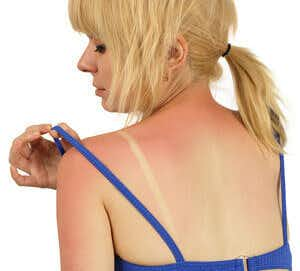
Forty years ago baby boomers enjoyed soaking up the sun’s rays and admiring their golden tans. Today, they are spending more time with dermatologists and plastic surgeons trying to undo the damage. Age spots, wrinkles and skin cancers are the price paid for exposure to ultraviolet radiation. In addition, the drugs that they may be taking could contribute to bad sunburns.
What Did People Do Before Sunscreens?
Back before sunscreens, people had to exercise some judgment when they went outside or they would inevitably experience bad sunburns. People took beach umbrellas with them to the seashore, and lifeguards smeared their noses and lips with white zinc oxide cream. Farmers and other folks who worked out of doors wore hats, not as a fashion statement, but to protect their heads and faces from the sun.
Why Sunscreens Can Cause Problems:
Sunscreens have been a mixed blessing. Because people who use them usually don’t burn, or even turn pink, they develop a false sense of security. People stay out longer and don’t avoid excess sun exposure. As a result, they may be damaging DNA in the deeper layers of the skin and suppressing their immune systems.
Even the best sunscreen cannot protect your eyes. Research shows that ultraviolet (UV) radiation damages the lens and the retina and may contribute to the development of cataracts.
Drugs and Sun Can Cause Bad Sunburns:
Beware of Damage to the Eyes:
Both skin and eyes are more susceptible to harm from the sun when people are taking certain medications or even herbs. Research by Joan Roberts, Ph.D., and her colleagues demonstrates that hypericin, an ingredient in St. John’s wort, reacts with sunlight to cause changes in the lens of the eye (Free Radical Biology & Medicine, July 2013). This may increase the risk of cataracts.
Sunglasses may not protect the eye adequately if a person is taking St. John’s wort, and might even make the situation worse. Because hypericin is activated by visible light as well as ultraviolet, the best approach is to avoid bright sunlight.
Drugs That Cause Photosensitivity:
Other medicines that may make eyes more vulnerable to light include the heart drugs amiodarone and propranolol, the blood pressure medicine hydrochlorothiazide, and medications used to treat schizophrenia (chlorpromazine and thioridazine).
Many commonly prescribed medications also make the skin more susceptible to UV radiation. One man taking cotrimoxazole (Bactrim, Septra) for a urinary tract infection developed a painful sunburn after just one round of golf. He was fortunate: he recovered.
One reader is aware of the cotrimoxazole problem and wonders how long it lasts.
Q. How long does it take after stopping a sulfa antibiotic for sun sensitivity to wear off?
A. Several antibiotics such as tetracyclines and fluoroquinolones as well as cotrimoxazole can cause increased sun sensitivity (phototoxicity). Exaggerated sunburn or skin darkening may occur with modest sun exposure. The case reports we found do not answer your question. No one seems ready to say how long this effect may last. Experiment cautiously!
A Lethal Sunburn:
We heard of a woman who died from complications of sunbathing while on vacation in Florida. She was taking enalapril (Vasotec), diltiazem (Cardizem) and lovastatin (Mevacor), all of which may cause photosensitivity reactions in some people.
Learn More:
If you would like to know more about medicines that can increase the risk of skin damage, bad sunburns and ways to avoid trouble, you may want to consult our Guide to Skin Care & Treatment.
Since parasols are not likely to make a reappearance on the fashion scene, we will have to take other measures to protect skin and eyes. A high SPF (30+) sunscreen is a good start. In addition, a hat that shades the ears and neck as well as the face is essential. Don’t forget sunglasses with 100 percent UV protection.
Even more important, stay out of the midday sun. As tempting as it may be to lounge around the pool in a skimpy suit, it is smarter to remain under cover between 10 and 2. Common sense and sunscreen can make summer sunshine delightful rather than dangerous.
Citations
- Ehrenshaft M et al, "Hypericin-mediated photooxidative damage of α-crystallin in human lens epithelial cells." Free Radical Biology & Medicine, July 2013. DOI: 10.1016/j.freeradbiomed.2013.02.023

